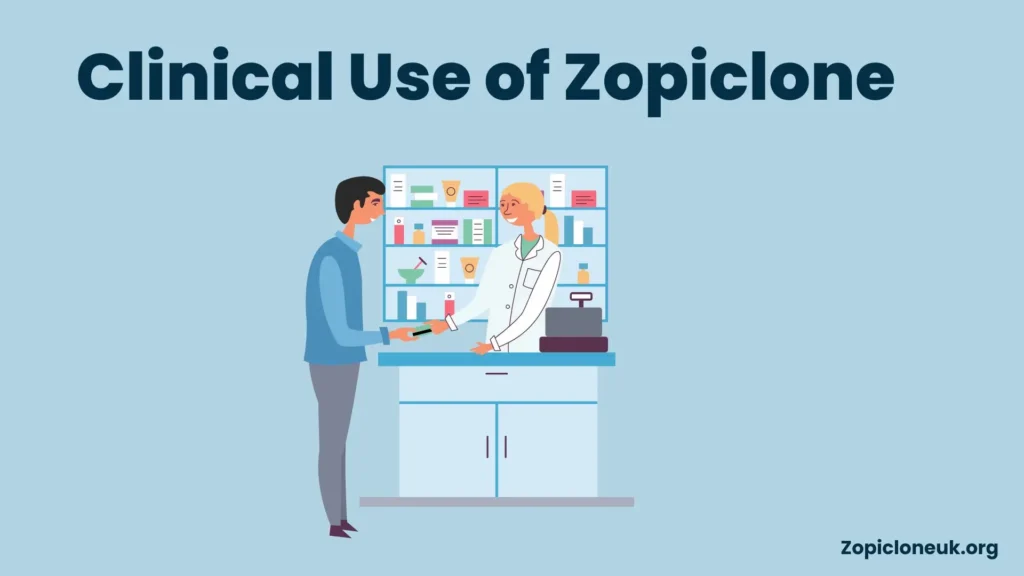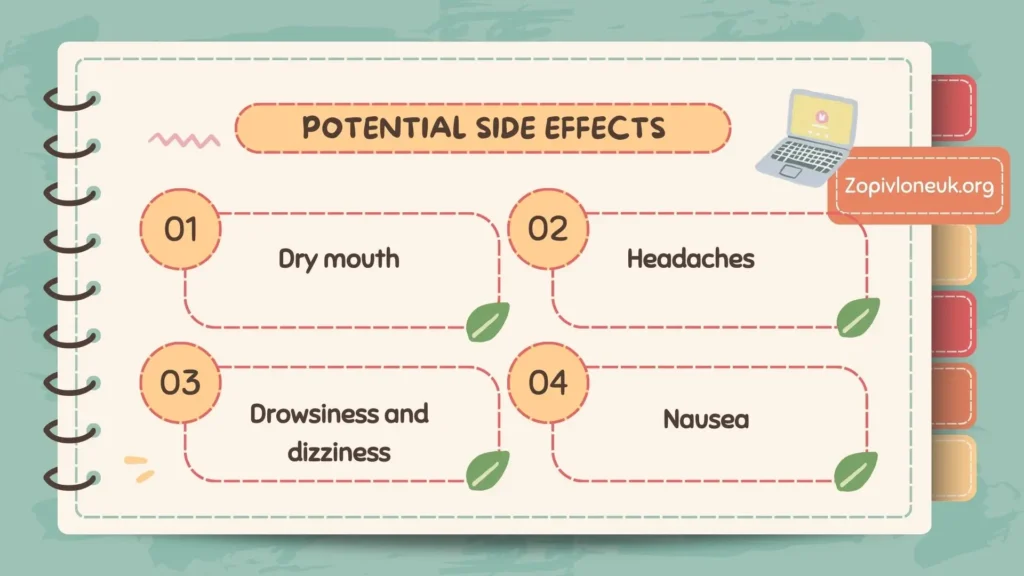
Clinical Use of Zopiclone:- Zopiclone is a widely prescribed medication used primarily for the short-term treatment of insomnia. This blog will delve into its clinical use, benefits, dosage, side effects, and essential considerations for those prescribed this medication. By understanding Zopiclone’s clinical application, patients and healthcare providers can better manage insomnia and improve sleep quality.
Contents
- 0.1 What is Zopiclone?
- 0.2 Clinical Use of Zopiclone
- 0.3 Benefits of Zopiclone
- 0.4 Precautions and Warnings
- 0.5 Tips for Safe Use
- 0.6 Extra Tips for Better Sleep
- 0.7 Side Effects and Considerations
- 0.8 Considerations for Use
- 0.9 FAQs
- 0.10 Q: How long does it take for Zopiclone to work?
- 0.11 Q: Can I take Zopiclone every night?
- 0.12 Q: What should I do if I miss a dose of Zopiclone?
- 0.13 Q: Can I drink alcohol while taking Zopiclone?
- 0.14 Q: What are the signs of Zopiclone dependence?
- 1 Author Details
What is Zopiclone?
Zopiclone is a non-benzodiazepine hypnotic agent used to treat insomnia. It helps individuals fall asleep more quickly, maintain sleep during the night, and wake up less frequently. Unlike traditional benzodiazepines, Zopiclone has a different chemical structure but similarly enhances the action of the neurotransmitter gamma-aminobutyric acid (GABA) in the brain, leading to sedative effects.
Clinical Use of Zopiclone
Treatment of Insomnia
The primary clinical use of Zopiclone is for the short-term treatment of insomnia. Insomnia is characterized by difficulty falling asleep, staying asleep, or experiencing non-restorative sleep. Zopiclone is particularly effective in reducing sleep onset latency, increasing total sleep time, and improving overall sleep quality. It is often prescribed when insomnia significantly impacts daily functioning and quality of life.
Dosage and Administration
Zopiclone is typically prescribed in dosages ranging from 3.75 mg to 7.5 mg, taken orally just before bedtime. The standard dose for adults is 7.5 mg, but for elderly patients or those with hepatic impairment, a lower dose of 3.75 mg may be recommended to minimize the risk of side effects. It is essential to follow the prescribed dosage and not to exceed the recommended duration of use, which is usually limited to 2-4 weeks.
Benefits of Zopiclone
Improved Sleep Quality
One of the significant benefits of Zopiclone is its ability to improve sleep quality. Patients often report falling asleep faster, experiencing fewer night awakenings, and waking up feeling more rested. This can lead to better daytime functioning and overall well-being.
Short-Term Use
Zopiclone is designed for short-term use, which reduces the risk of dependence and withdrawal symptoms associated with long-term use of hypnotic medications. This makes it a safer option for managing acute episodes of insomnia.
Tolerability
Zopiclone is generally well-tolerated by most patients. Common side effects are usually mild and include a metallic taste, dry mouth, and dizziness. Serious side effects are rare when the medication is used as prescribed.
Read Also:- About Zopiclone
Precautions and Warnings
- Dependence and withdrawal: Prolonged use of Zopiclone can lead to physical and psychological dependence. Withdrawal symptoms, such as anxiety, agitation, and rebound insomnia, may occur if the medication is abruptly discontinued.
- Caution in certain populations: Zopiclone should be used with caution in elderly patients, individuals with respiratory conditions, and those with a history of substance abuse.
- Avoiding alcohol: Combining Zopiclone with alcohol can enhance its sedative effects, leading to increased drowsiness and risk of accidents.
Tips for Safe Use
- Follow the prescribed dosage: Never exceed the recommended dose without consulting a healthcare provider.
- Establish a bedtime routine: Incorporate relaxation techniques and maintain a consistent sleep schedule to enhance the effectiveness of Zopiclone.
- Avoid long-term use: Use Zopiclone only as prescribed and avoid prolonged use to reduce the risk of dependence.
Extra Tips for Better Sleep
- Maintain a sleep-friendly environment: Ensure your bedroom is cool, dark, and quiet.
- Limit caffeine and heavy meals: Avoid consuming caffeine or large meals close to bedtime.
- Stay active during the day: Regular physical activity can promote better sleep.
Side Effects and Considerations
Common Side Effects
While Zopiclone is effective in treating insomnia, it may cause some side effects. The most common side effects include:

-
- Nausea
-
- Dry mouth
-
- Drowsiness
-
- Dizziness
These side effects are typically mild and tend to diminish with continued use.
Serious Side Effects
In rare cases, Zopiclone can cause more severe side effects, such as:
-
- Memory problems
-
- Mood changes
-
- Hallucinations
-
- Allergic reactions (rash, itching, swelling)
If any of these occur, it is crucial to seek medical attention promptly.
Read Also:- side effects of zopiclone
Considerations for Use
Contraindications
Zopiclone should not be used by individuals with:
-
- Severe liver impairment
-
- Sleep apnea syndrome
-
- Myasthenia gravis
-
- Severe respiratory insufficiency
Drug Interactions
Zopiclone can interact with other medications, including:
-
- Other central nervous system depressants (e.g., alcohol, benzodiazepines)
-
- CYP3A4 inhibitors (e.g., ketoconazole, erythromycin)
These interactions can enhance the sedative effects of Zopiclone and increase the risk of side effects.
Clinical Information for Healthcare Providers:
For healthcare providers, Zopiclone represents a useful option for managing insomnia, particularly in cases where rapid sleep induction is necessary. Its non-benzodiazepine nature and favorable side effect profile make it a suitable choice for short-term use. However, it is crucial to monitor patients for signs of dependence and withdrawal, and to advise them on proper sleep hygiene practices to maximize treatment benefits.
Pregnancy and Breastfeeding
Zopiclone is not recommended for use during pregnancy or breastfeeding due to potential risks to the fetus or infant. Women who are pregnant or planning to become pregnant should discuss alternative treatments for insomnia with their healthcare provider.
Read Also:- Zopiclone and Breastfeeding
FAQs
Q: How long does it take for Zopiclone to work?
A: Zopiclone typically starts working within 30 minutes to an hour after taking it. It is recommended to take it just before bedtime.
Q: Can I take Zopiclone every night?
A: Zopiclone is intended for short-term use, usually not exceeding 2-4 weeks. Continuous use can lead to dependence and decreased effectiveness.
Q: What should I do if I miss a dose of Zopiclone?
A: If you miss a dose of Zopiclone, take it as soon as you remember, provided it is still close to bedtime. If it is almost time for your next dose, skip the missed dose and resume your regular schedule. Do not double up on doses.
Q: Can I drink alcohol while taking Zopiclone?
A: It is not advisable to drink alcohol while taking Zopiclone, as alcohol can enhance the sedative effects and increase the risk of side effects.
Q: What are the signs of Zopiclone dependence?
A: Signs of dependence may include a strong urge to take Zopiclone, inability to sleep without it, and withdrawal symptoms when not taking the medication. If you suspect dependence, consult your healthcare provider.
Author Details




Medical content by qualified psychiatrists
Our editorial policy

Zopiclone precautions Read our potential abuse notice

Looking for a seller? Locate the best Zopiclone vendor






